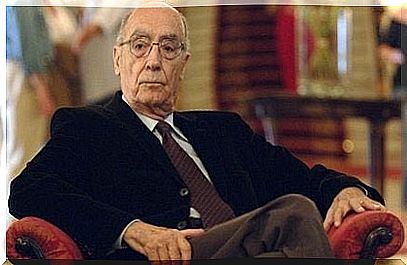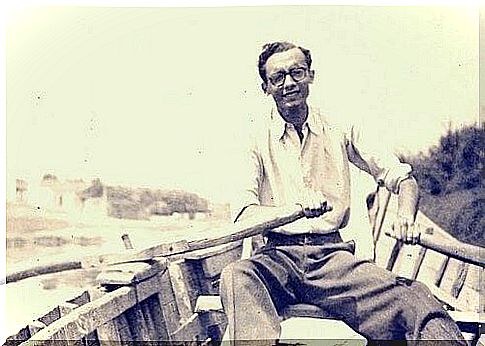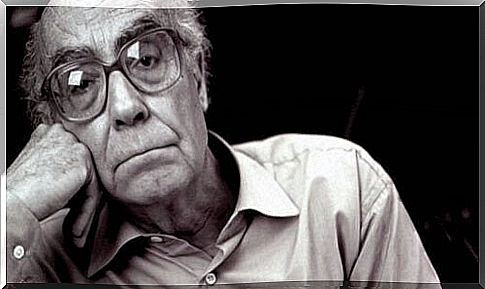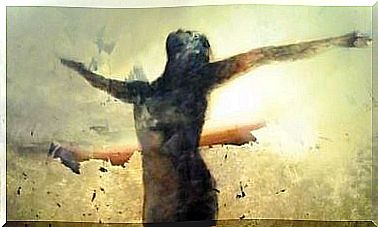José Saramago: The Biography Of The Writer Who Spoke About Social Blindness

José Saramago was the most notable voice in Portuguese Letters. The excellence of his writing allowed him to win the Nobel Prize, and something that always characterized him was his facet of a committed man. Thus, works such as Essay Sobre a Cegueira are launched as an exceptional vehicle for catharsis and philosophical reflection, a legacy that invites us to “wake up”.
It is often said that Saramago was a stirrer of conscience. He never stopped denouncing injustices and taking a stand in the face of any conflict of his time. That’s why, in one of his lectures, he defined himself as a passionate writer, someone with the need to lift any stone, even though he knew that real monsters could be hiding underneath.
This search for truth and this effort to awaken minds allowed him to shape a unique literary style. He used parables supported with imagination, irony and compassion to sketch for us a reality in front of which no one could remain indifferent.
After José Saramago’s death, his work continues to be republished in different languages. New generations continue to discover their voice and admire this polyhedral personality, who even aspired to complete the Universal Declaration of Human Rights with its Charter of Duties and Obligations.
He was the most illustrious writer that Portugal offered us, along with other authors such as Fernando Pessoa. Saramago is responsible for a provocative, magical and disturbing work that invited us to analyze the present through his eyes.

José Saramago, a scholar with humble roots
José de Sousa Saramago was born on November 16, 1922 in Golegã, Portugal. His parents were José de Sousa and Maria de Piedade, a couple with humble roots who made their living from their work on the land. When little José was two years old, they decided to move to Lisbon in search of a better life.
Established in the Portuguese capital, they enjoyed a certain stability. His father started working as a policeman, and he had the opportunity to attend elementary school. He attended an industrial school for years until his parents could no longer afford him a more advanced education.
As a result, he had no choice but to start working in an auto repair shop. However, in addition to this professional activity with which José Saramago earned his living, he kept another one in parallel: that of a scholar. He hasn’t stopped reading, learning on his own, and above all writing. So, at the age of 25, he published Terra do Pecado. In the same year, 1947, his daughter, Violante, was also born, the result of his first marriage.
The maturing of a committed writer and journalist
From 1955 onwards José Saramago began to translate the works of Hegel and Tolstoy into Portuguese. At the same time, he strives to mature his style appropriately, to have some opportunity to achieve success with his writings. However, despite their talent, no publisher dares to put their work on the market.
After the rejection of his work Clarabóia , José Saramago took several years to try again. In fact, that didn’t happen until 1966 when he tried again with Probably A Legria and later with The Year 1993 . Both gained recognition from the publishers, so he began to collaborate with the Portuguese publisher Estúdios Cor .
Having reached literary success, José Saramago felt the need to embark on journalism. He starts working on the “Diário de Notícias” and, later, on the “Diário de Lisboa”, becoming adjunct editor and political commentator.

However, after the arrival of the Carnation Revolution in Portugal, on April 25, 1974, he decided to dedicate himself exclusively to writing. He was a recognized and respected figure, and he yearned to give the world more work, more books. In 1976, he published Os Apontamentos , plays such as A Noite (1979) and short stories such as Objecto Quase (1978) .
The Nobel Prize
In the 1980s, José Saramago was already a world-renowned author. He won literary consecration with Memorial do convent. Later came A Jangada de Pedra (1986), the controversial The Gospel According to Jesus Christ (1991) and, above all, Essay Sobre a Cegueira (1995).
His writing was more refined, and his books more committed. Thus, in 1998, the Stockholm Committee (Sweden) awarded him the highest recognition: the Nobel Prize for Literature. At that time, he already lived between two lands: Lisbon and Lanzarote (Canary Islands). In the latter location, he shared his life with his last wife, Maria del Pilar del Río Sánchez, a Spanish journalist and translator.
José Saramago died on June 18, 2010 due to leukemia. He was 87 years old and had started a new novel, of which he had written just 30 pages.
Blindness essay
They are not blind, “they are blind”. With these words, José Saramago gives shape to one of the most disturbing argumentative metaphors in his work. In Essay About Blindness, he talks about the inability of human beings to recognize others. He suddenly turns us into infamous beings, creatures who need others’ guidance to understand and survive.
This work is a profound reflection on the human soul. It is a dystopian novel, in front of which no one is indifferent to discovering how the human being was suspended in a kind of white blindness that spreads like an infection. The government then decides to quarantine the sick, subjecting them to strict rules.
Among this group of people who star in the narration, only one can see: a woman who decides to accompany her husband in this confinement, being, at the same time, her eyes and a helpful look that tries to help others. However, the whole scene is oppressive. There is no hygiene, soldiers do not hesitate to fire when someone gets too close and degradation begins to take hold. Everything suddenly takes on the colors of a true dictatorship. Chaos reigns, and hope is slowly consumed.

We are, therefore, facing a work that presents us, above all, the blindness of the human soul. This inability to recognize ourselves that evokes selfishness, loss of reason, conflict and fear. A setting in which José Saramago invites us to courageous moral reflection.
Essay Sobre a Cegueira is, without a doubt, an impressive book, which launches itself as one of the great works of contemporary literature, to which it is always worth returning (or discovering it for the first time).









